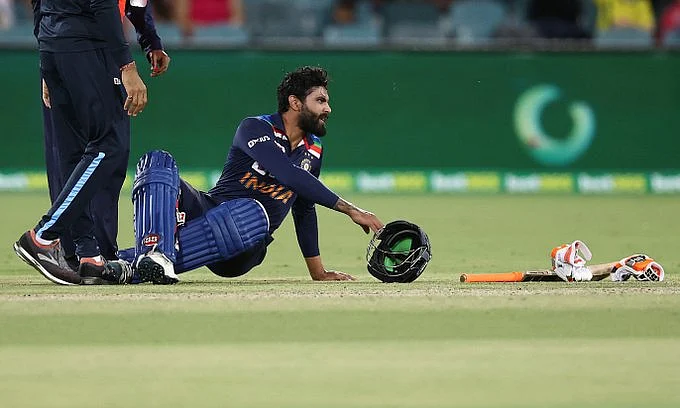The dangers of a concussion or a head injury in sport has been one of the most discussed topics in recent years and authorities across sports are doing all they can to stick to the old adage, prevention is better than cure.
On Friday in Canberra, Ravindra Jadeja copped a nasty blow to the helmet in the final over while facing Mitchell Starc and was replaced by Yuzvendra Chahal as a concussion substitute before Australia started their chase.
The change in personnel did not go down too well with Australia who made a clear distinction in the roles both Jadeja and Chahal play when Moises Henriques spoke to the media after the game. It was not just Henriques – head coach Justin Langer too seemed unimpressed and was seen to be having an animated conversation with match referee David Boon during the interval.
Was the substitution like-for-like? Was Australia’s anger justified? We try to clear the air and wish Jadeja a speedy recovery.
1. What is a Concussion Substitute? When Did ICC Introduce It?
In July 2019, the International Cricket Council allowed like for like concussion substitutes in case a player got hit on the head. The ICC approved the player replacements in all formats of men and women’s international cricket and for first-class cricket as well worldwide. The rule came into effect from 1 August, 2019.
“Teams will have the option of replacing a player who has sustained a head or neck injury during an international match and has subsequently been diagnosed with concussion or suspected concussion,” the ICC rule states.
2. When Can a Team Use a Concussion Substitute?
Here’s what the ICC specifies about the conditions under which a team can ask for a concussion replacement:
1.2.7 If a player sustains a concussion or suspected concussion as a result of a head or neck injury during the course of the relevant match, a Concussion Replacement may be permitted in the following circumstances:
1.2.7.1 The head or neck injury must have been sustained during play and within the playing area.
1.2.7.2 A concussion or suspected concussion must have been formally diagnosed by the Team Medical Representative.
1.2.7.3 The Team Medical Representative or Team Manager shall submit a Concussion Replacement Request to the ICC Match Referee on a standard form.
1.2.8 The ICC Match Referee should ordinarily approve a Concussion Replacement Request if the replacement is a like-for-like player whose inclusion will not excessively advantage his team for the remainder of the match.
1.2.8.1 In assessing whether the nominated Concussion Replacement should be considered a like-for-like player, the ICC Match Referee should consider the likely role the concussed player would have played during the remainder of the match, and the normal role that would be performed by the nominated Concussion Replacement.
1.2.8.2 If the ICC Match Referee believes that the inclusion of the nominated Concussion Replacement, when performing their normal role, would excessively advantage their team, the Match Referee may impose such conditions upon the identity and involvement of the Concussion Replacement as he/she sees fit, in line with the overriding objective of facilitating a like-for-like replacement for the concussed player.
1.2.8.3 The ICC Match Referee may, in reviewing a Concussion Replacement Request made in accordance with clause 1.2.7.3, request any such further information as may be required in order to make the determination required under clauses 1.2.8.1 and 1.2.8.2.
3. What Happened in Ravindra Jadeja’s Case?
On Friday evening in Canberra, Ravindra Jadeja edged a Mitchell Starc delivery onto his helmet with four deliveries left in India’s innings.
The Indian all-rounder played out the final over and was checked on by the medical team after the innings and was then replaced by leg-spinner Yuzvendra Chahal, who finished with a Player of the Match performance.
Jadeja, who scored 30 runs off his final 10 deliveries faced, remained unbeaten on 44 off 23 deliveries and did not take the field thereafter.
4. What Was Australia’s Concern?
Australia were not very happy about the change in personnel and Moises Henriques raised the point after the match saying the problem was that the players were not like for like.
Head coach Justin Langer too was seen having an animated discussion with Match Referee David Boon during the innings break with captain Aaron Finch watching on. Langer left the conversation rather unhappy.
“I think the only real issue is you’ve got to ask yourself was it a like-for-like replacement? Is he (Jadeja) an (sic) out-and-out spinner?” Henriques said.
"Like for like, from my point of view, it would definitely be one's an allrounder and a gun fielder, and the other one is an out-and-out bowler who bats (at) 11. That is the only thing from my point of view. It had nothing to do with his hammy (hamstring). I'd like to look at it as like-for-like decision."
"I think the concussion was fine. If the player gets hit on the head, he needs to be replaced if doctor thinks, it is fine.”
5. How is Jadeja Now?
The all-rounder is being monitored by the medical team of the Indian cricket team and has been ruled out of the final two T20Is, the BCCI confirmed on Friday evening. India have drafted in Shardul Thakur as his replacement.
India’s Updated T20I Squad
Virat Kohli (Captain), KL Rahul (VC & WK), Shikhar Dhawan, Mayank Agarwal, Shreyas Iyer, Manish Pandey, Hardik Pandya, Sanju Samson (WK), Washington Sundar, Yuzvendra Chahal, Jasprit Bumrah, Mohammed Shami, Navdeep Saini, Deepak Chahar, T Natarajan, Shardul Thakur.
(At The Quint, we question everything. Play an active role in shaping our journalism by becoming a member today.)
